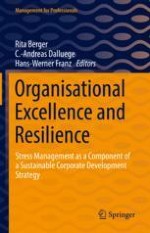Personal stress has an enormous impact on organizational and employee performance. This book introduces the web-based diagnostic tool IMPRESS, which provides employees, managers and HR professionals with information about potential stress factors. The book describes the underlying methodology for this integrated approach and presents the tools and learning modules to support the methodology. A series of case studies from pilot implementations in companies and universities illustrate the application of the approach in a variety of work environments.
The book is based on an international research project for a holistic approach to stress prevention by combining Human Systems Audit with the European Excellence approach as promoted by the Common Assessment Framework (CAF) and the EFQM Excellence Model. This approach is intended to contribute to organizational development that supports effective employee stress management.
